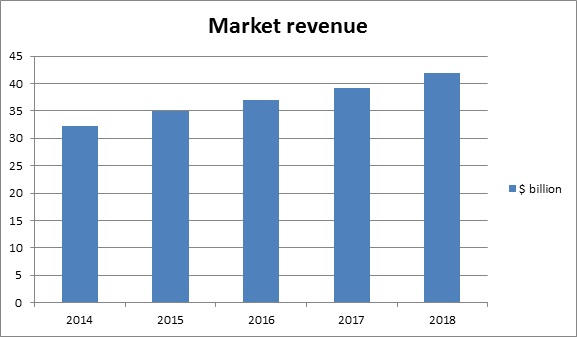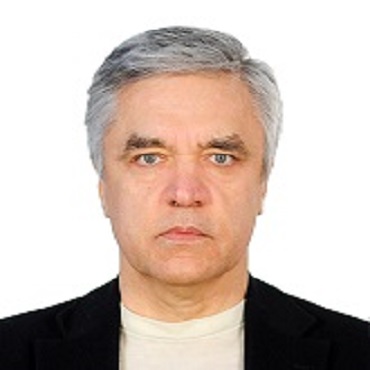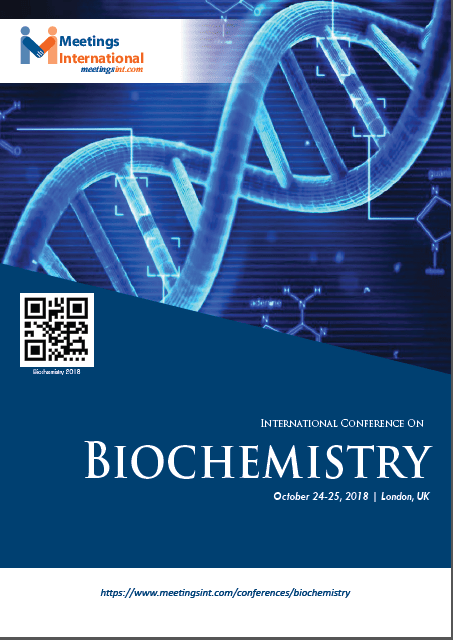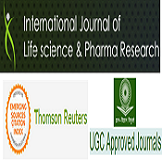
Biochemistry 2018

Theme: Revolution and upcoming movements in the arena of Biochemistry
Biochemistry Conference will be held in London, UK during October 22-23, 2018. It will bring together world-class biochemists, scientists and professors to discuss the multidisciplinary field with research and interests covering all aspects of recent molecular and cellular biochemistry. In this Biochemistry event, it is often deliberated as a tool to investigate and to study molecular biology. It deals with the structure, function and relations amongst biological macromolecules. The theme of the Biochemistry conference "Revolution and upcoming movements in the arena of Biochemistry", will focus on the study of the molecular mechanisms by which genetic information present on DNA is able to result in the processes of life. Biochemistry has its applications in various fields. The summit of biochemistry is intended to apply primarily in medicine, nutrition, and agriculture. In medicine, biochemists investigate the cause and cure for the disease. In nutrition, they study how to maintain health and study the effects of deficiency of nutrients. In agriculture, biochemists investigate soil and fertilizers, and try to discover ways to improve crop cultivation. Its storage and pest control.
Session 1: Biochemistry: Research and Innovation
Biochemistry is putting into practice of chemistry to learning of biological processes at the cellular and molecular level. Biochemistry Conference explores the chemistry in living organisms at the molecular basis occurring in living cells. It uses the methods of physics, molecular biology, chemistry and immunology to study the structure as well as behavior of the complex molecules found in biological entities and the way in which these molecules interact amongst themselves to form cells, tissues and whole organisms.
This field is now the foundation for understanding all biological processes in an organism. It includes exciting emerging fields such as molecular genetics and bioengineering. Biochemistry also provides teaching and research in both protein structure and function. Biochemistry also includes many subspecialties such as neurochemistry congress, bioorganic chemistry, clinical biochemistry conference, physical biochemistry, molecular genetics, biochemical pharmacology and immunochemistry. Recent advances in these areas have created links among technology, chemical engineering and biochemistry.
Relevant: Biochemistry Conferences | Molecular Biology Conference | Chemistry Conference | Lipid Conference | Carbohydrate summit | Peptide Congress | Protein Conference | Green Chemistry Conference | Food Chemistry Conference | Nutrition Congress | Chemical Engineering Congress | Hydrocarbon Meeting | Carbon Conference | Biochemistry Events | Biochemistry Meetings
Session 2: Green Chemistry
Green Chemistry Meeting is not only an important field of basic science explaining the molecular function of a plant, but is also an applied science that is in the position to contribute to the solution of agricultural and pharmaceutical problems. Plants are the source of important industrial raw material such as fat and starch but they are also the basis for the production of pharmaceutics. It is expected that in the future, gene technology will lead to the extensive use of plants as a means of producing sustainable raw material for industrial purposes. As such, the techniques and use of genetic engineering to improve crop plants and to provide sustainable raw materials for the chemical and pharmaceutical industries are described in this edition. The latest research findings have been included, and areas of future research are identified.
Relevant: Biochemistry Conferences | Molecular Biology Conference | Chemistry Conference | Lipid Conference | Carbohydrate summit | Peptide Congress | Protein Conference | Green Chemistry Conference | Food Chemistry Conference | Nutrition Congress | Chemical Engineering Congress | Hydrocarbon Meeting | Carbon Conference | Biochemistry Events | Biochemistry Meetings
Session 3: Microbial and Metabolic Biochemistry
Microbial biochemistry comprises of biochemical reactions in microbial development, several modes and mechanisms/methods of pathogenesis required in causing contamination/ diseases in the host. It involves the study of microbial growth, microbial cell structure, microbial metabolism, primary and advanced functions and the interactions of biological macromolecules, like carbohydrates, proteins, Fatty Acids and Lipids and nucleic acids; which cater the skeletal aspect and basis of functions affiliated with life. Biochemical conference is the study of microbes is crucial in the processes of their action. Post genomic analyses, maintenance of mechanisms, & functional replication, integrating plasmid functions, conjugation systems and regulatory network are the key factors that play a vital role in metabolism of microbes. When monomers are co-linked to synthesize a polymer, dehydration occurs often resulting in assembly of different macromolecules in much larger complexes.
Relevant: Biochemistry Conferences | Molecular Biology Conference | Chemistry Conference | Lipid Conference | Carbohydrate summit | Peptide Congress | Protein Conference | Green Chemistry Conference | Food Chemistry Conference | Nutrition Congress | Chemical Engineering Congress | Hydrocarbon Meeting | Carbon Conference | Biochemistry Events | Biochemistry Meetings
Session 4: Food Chemistry and Nutrition
Food Chemistry Conference is the study of the chemical composition, processes and interactions of all biological and non-biological components of foods. It includes macro- and micronutrients, and the essential nutritional factors that determine the nutritional and energy value of food raw materials and foods. It also includes reactions related to amino acids, peptides and proteins, fats and other lipids, carbohydrates, vitamins, mineral substances and water which are responsible for odor, taste and color that determine the quality of food materials and foods.
Nutritional Biochemistry is the investigation of sustenance as a science. Nutritional Biochemistry manages different investigations in supplements, nourishment constituents and their capacity with respect to people and different warm-blooded creatures, Nutritional Biochemistry particularly concentrates on supplement synthetic segments, and how they work biochemically, physiologically, metabolically, and in addition their effect on illness. Nutritious Biochemical research is for the most part required after characterizing dietary and wholesome needs in wiped out and solid people and the decrease of reactions of pharmaceutical medications.
Nutritional Biochemistry keeps up with the impression of system by which eating regimen impacts human wellbeing and disease condition. It basically contributes with the properties of supplements, distinctive dietary substitutes and the investigation of their physiological, metabolic, biochemical and epigenetic capacities. nourishing natural science might be a joined kind of science since it consolidates physiology, pharmacology, solution, science, microbiology and science and executes these sciences particularly to investigation of ailment conditions, wellbeing, sustenance, and the associations that exist between them.
Relevant: Biochemistry Conferences | Molecular Biology Conference | Chemistry Conference | Lipid Conference | Carbohydrate summit | Peptide Congress | Protein Conference | Green Chemistry Conference | Food Chemistry Conference | Nutrition Congress | Chemical Engineering Congress | Hydrocarbon Meeting | Carbon Conference | Biochemistry Events | Biochemistry Meetings
Session 5: Molecular Biochemistry
The study of living things at the molecular level has undergone tremendous expansion in recent years, leading to ever-increasing insights into topics as various as the origin of life, the nature of disease and the development of individual organisms. Powerful new techniques, such as those of molecular genetics and NMR spectroscopy, enable us to analyze biological phenomena in more and more precise molecular terms. These studies have led to commercially valuable developments in drug design and synthesis, forensic science, environmental sensing and a whole range of other areas. Furthermore, advances in biochemistry are largely responsible for the breakdown of traditional boundaries between cell biology, medicine, physics and chemistry as their applications become increasingly wide reaching.
A major branch of Biochemistry, molecular biochemistry deals with the varied aspects of macromolecules at the structural and functional levels. It deals with the interactions amongst different cell components including macromolecules like nucleic acids, proteins, lipids and carbohydrates. This field has grown to encapsulate virtually the wide array of chemistry, physics, medicine and biology. One of the most important aspects of molecular biology is to discover and understand the chemical properties of the molecules. The various processes that occur within the cell are responsible for their structure maintenance, reproduction and response to stimuli.
Relevant: Biochemistry Conferences | Molecular Biology Conference | Chemistry Conference | Lipid Conference | Carbohydrate summit | Peptide Congress | Protein Conference | Green Chemistry Conference | Food Chemistry Conference | Nutrition Congress | Chemical Engineering Congress | Hydrocarbon Meeting | Carbon Conference | Biochemistry Events | Biochemistry Meetings
Session 6: Pharmaceutical Biochemistry
The field Pharmaceutical Biochemistry Conference combines the knowledge of biochemistry and chemistry and applies to the production of useful drugs.
This mainly concerns with the science of drugs, their clinical use and the study of their adverse effects on cells and living organisms. It provides a complete understanding of all of the chemical processes occurring and associated with living cells at the molecular level that is relevant to drug action. It also helps to acquire knowledge on the adverse effects, molecular targets, and characterization of drugs or any chemical substance within the living cells and organisms.
Relevant: Biochemistry Conferences | Molecular Biology Conference | Chemistry Conference | Lipid Conference | Carbohydrate summit | Peptide Congress | Protein Conference | Green Chemistry Conference | Food Chemistry Conference | Nutrition Congress | Chemical Engineering Congress | Hydrocarbon Meeting | Carbon Conference | Biochemistry Events | Biochemistry Meetings
Session 7: Colloidal Nano Crystal Synthesis and Organic, Inorganic Interface
Colloidal Nano crystals are solution-grown, nanometer-sized, inorganic particles that are stabilized by a layer of surfactants attached to their surface. The inorganic cores possess useful properties that are controlled by their composition, size and shape, and the surfactant coating ensures that these structures are easy to fabricate and process further into more complex structures. This combination of features makes colloidal Nano crystals attractive and promising building blocks for advanced materials and devices. Chemists are achieving ever more exquisite control over the composition, size, shape, crystal structure and surface properties of Nano crystals, thus setting the stage for fully exploiting the potential of these remarkable materials.
Relevant: Biochemistry Conferences | Molecular Biology Conference | Chemistry Conference | Lipid Conference | Carbohydrate summit | Peptide Congress | Protein Conference | Green Chemistry Conference | Food Chemistry Conference | Nutrition Congress | Chemical Engineering Congress | Hydrocarbon Meeting | Carbon Conference | Biochemistry Events | Biochemistry Meetings
Scope and Importance of Biochemistry Research
Biochemistry deals with the chemistry of living organisms and their biological processes. Biochemistry has its importance in almost all the branches of Biological Sciences, it is widely employed in Clinical Diagnostics, Pathology, Physiology, Nutrition, Nursing, Pharmacy, laboratory procedures, Industry, Agriculture etc., This field of science helps one understand the actual chemical and biological concepts in both plant and animals.
Over the last decades of 20th century, biochemistry has become so successful in explaining living processes that in current generation almost all areas of the life sciences from botany to medicine to genetics are effectively engaged in biochemical research.
Therefore, it is actually a dynamic and exciting science that contributes important information to most of the subjects in biology, physiology, genetics, medicine, nutrition, agriculture and immunology; practically all of the primary specialties on the life sciences.
The Global Biochemistry Analyzer market to grow at a Compound Annual Growth Rate (CAGR) of 6.02% during the period 2017-2021.
The report, Global Biochemistry Analyzer Market 2017-2021, has been prepared based on an in-depth market analysis with inputs from industry experts. The report covers the market landscape and its growth prospects over the coming years. The report also includes a discussion of the key vendors operating in this market.
The latest trend gaining momentum in the market is modular design of biochemistry analyzer. The fully automatic biochemistry analyzer is used to analyze many biochemical parameters of blood sample like blood glucose, urea, protein, etc., to detect various diseases like kidney, liver, and other metabolic disorders. Therefore, by analyzing these parameters, the biochemistry analyzer helps in diagnosing various health disorders. It is a high performance-based micro-controller inbuilt with the photometric technology.
According to the report, one of the major drivers for this market is growing aging population. The increase in median age due to the reduction in fertility rate and the increase in life expectancy result in the growing aging population. These two demographic effects reflect the change in a country's population with a rising aging and a declining child population.
Why London, UK?
London is the capital city of England and the United Kingdom. It is the most crowded locale, urban zone and metropolitan city in the United Kingdom. Remaining on the River Thames, London has been a noteworthy settlement for two centuries, its history backpedaling to its establishing by the Romans, who named it Londinium. London is a main worldwide city, with qualities in expressions of the human experience, business, instruction, excitement, mold, fund, medicinal services, media, proficient administrations, innovative work, tourism, and transport all adding to its unmistakable quality. It is one of the world's driving money related focuses and has the fifth-or 6th biggest metropolitan range GDP on the planet relying upon estimation. London is a world social capital. It is the world's most-gone by a city as measured by universal entries and has the world's biggest city airplane terminal framework measured by traveler activity.
London's 43 colleges shape the biggest centralization of advanced education in Europe. In 2012, London turned into the primary city to have the current Summer Olympic Games three times. London has a differing scope of people groups and societies, and more than 300 dialects are talked inside its limits. It is a noteworthy focus of advanced education instructing and research and its 43 colleges shape the biggest grouping of advanced education in Europe. London contains four World Heritage Sites: the Tower of London; Kew Gardens; the site including the Palace of Westminster, Westminster Abbey, and St Margaret's Church; and the noteworthy settlement of Greenwich.
Today, London is the center of the pack, positioned number seven out of 14 equivalent urban areas around the globe. London can improve the situation, and match its social, monetary and political transcendence by being the world's most advantageous major worldwide city.
Top societies & associations associated with Biochemistry Research
Across the world:
The American Society for Biochemistry and Molecular Biology, America
European Federation for Clinical Chemistry and Laboratory Medicine, Europe
Japan Society of Clinical Chemistry (JSCC), Japan
Australian Society Biochemistry and Molecular Biology, Australia
Asia-Pacific Federation for Clinical Biochemistry and Laboratory Medicine: APFCB, Asia Pacific
Belgian Society of Biochemistry and Molecular Biology, Belgium
International Federation of Clinical Chemistry and Laboratory Medicine, China
Spanish Society for Clinical Biochemistry and Molecular Pathology, Spain
World Association for Chinese Biomedical Engineers, China
Chinese-American Chemical Society, China
The Hong Kong Medical Association, Honk Kong
The Chinese Society of Biochemistry & Molecular Biology, China
Chinese Chemical Society, China
Chinese Society for Cell Biology, China
Genetics Society of China, China
Biochemical Society, China
Top companies associated with Biochemistry Research
Randox, India
Malaysian Vaccines and Pharmaceuticals Sdn. Bhd, Malaysia
Thames Bioscience (M) Sdn. Bhd, Malaysia
Aurigene, India
INS Bioscience Berhad, Malaysia
Malaysian Bio-Diagnostics Research Sdn. Bhd, Malaysia
Bio-Rad Laboratories, Inc, USA
Siemens Healthcare, Germany
Abbott, Chicago
Mindray Medical International Limited, China
Danaher Corp, US
Thermo Fisher Scientific Inc, US
European Biochemistry Universities:
Carinthia University of Applied Sciences, UK
European University Cyprus, UK
The University of Manchester, UK
Lunds University, UK
Swiss Federal Institute of Technology Zurich, UK
The University of Edinburgh, UK
Catholic University of Leuven, UK
University of Oslo University of Southampton, UK
USA Biochemistry Universities:
McGill University, USA
Purdue University, USA
Tufts University, USA
University of Connecticut, USA
University of Illinois at Urbana-Champaign, USA
Bastyr University, USA
New York Chiropractic College, USA
The University of Bridgeport, USA
Boston University, USA
Colorado State, USA
Cornell University, USA
Harvard University, USA
Clemson University, USA
Rutgers University, USA
Stanford University, USA
Duke University, USA
Brown University, USA
Scripps Research Institute, USA
Yale University, USA
Asian Biochemistry Universities:
National University of Singapore, Singapore
University of Hong Kong, Hong Kong
KAIST - Korea Advanced Institute of Science & Technology, Asia
Nanyang Technological University, Singapore
Hong Kong University of Science and Technology, Hong Kong
The Chinese University of Hong Kong | Peking University, China
Seoul National University, Asia
Tsinghua University, Asia
The University of Tokyo, Japan
Osaka University, Asia
Kyoto University, Asia
Hokkaido University, Asia
University of Science and Technology of China, China
Nanjing University, Asia
Hanyang University, Asia
Scopes in Biochemistry:
public health nutrition consultant
Pilgrim's Nutritionist Internship
Nutrition and Wellness Specialist
Nutrition Svcs Lead - Food & Nutrition Svcs
Lifestyle Coach – Diabetes Prevention Program
Health Communications Fellowship-oash/hhs
Onsite Health Coach Extension Nutrition & Health Specialist
Horticulture & Nutrition Educator and Therapist
Remote Nutritionist Guest Blogger
Health and Wellness Coordinator
Visiting Professor – Nutrition
Food and Wellness Program Coordinator
Dietetics and nutrition program coordinator
- Carbohydrate, Lipid and Emulsion
- Green Chemistry
- Microbial and Metabolic Biochemistry
- Molecular Biochemistry
- Enzymology
- Food Chemistry and Nutrition
- Structural Biochemistry
- Pharmaceutical Biochemistry
- Biochemistry: Research and Innovation
- Colloidal Nano Crystal Synthesis and Organic, Inorganic Interface
- Journal of Biochemistry and Physiology
- Journal of Chemistry and Applied Chemical Engineering
8 Organizing Committee Members
8 Renowned Speakers
Thomas Meier
Imperial College London
UK
Edmund Kunji
University of Groningen
UK
Adrian Goldman
Yale University
UK
Muhammad Usman
Agricultural Research System
Pakistan
Luljeta Hetemi
Institut of Biochemistry Skopje Macedonia
Kosovo
Neelima Verma
NABL Medical Lead assessor
India
Krishna Sumanth Nallagangula
Sri Devaraj Urs Medical College
India
Thongchai Kaewphinit
Srinakharinwirot University
Thailand








































































































































